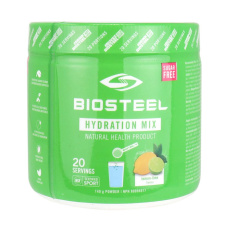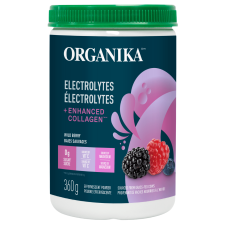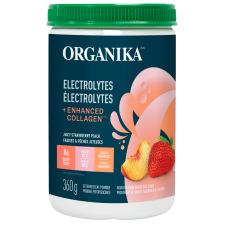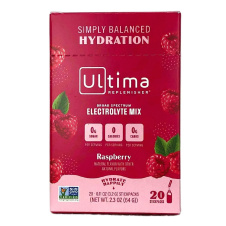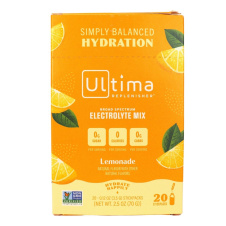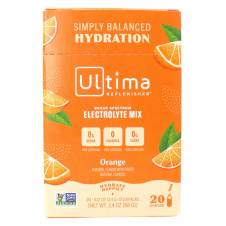
Why Should You Replenish Your Electrolytes?
They're not just the key component of trendy sports drinks and mixes, electrolytes are necessary for your overall health and wellbeing — especially if you workout or spend lots of time out in the sun! Find out why you should replenish your electrolytes and how to restore your body's electrolyte balance for optimal health!
If you’ve ever spent some time in the sun or put in work at the gym, then you’ve likely heard some talk about electrolytes. Or, if you haven’t, it is possible that you’ve walked past some very colourful drinks at the grocery store, or seen an ad by major brand names pushing you to replenish your electrolytes with their sports drink. But, do you really need to replenish your electrolytes? The answer is, absolutely! Electrolytes are crucial for your health. Not replenishing your electrolytes can be life threatening! Here’s why...
What Are Electrolytes?
Electrolytes are minerals like sodium, potassium, and chloride that your body needs in large amounts in order to function. When placed in water these minerals have an electric charge, hence the term “electro-”. You can think of electrolytes as electricity. You need electricity to accomplish a large majority of activities in modern life. The same thing happens within our bodies. Without electrolytes our body doesn’t have the power to perform essential tasks like muscle movement.
Why Are Electrolytes Important?
Electrolytes are involved in some crucial functions. Maintaining a proper electrolyte balance is crucial for everyone, but especially for active individuals, the elderly, and those residing in hot weather. If the balance is disturbed, then you could be in some serious trouble.
Some of the main functions of electrolytes are:
- Hydration: Electrolytes, specifically sodium, help keep your body hydrated. Seems like an easy task, but you have to consider that your body is mostly made of water, so it's a very big job. To you it may just seem like quenching your thirst, but to our bodies over or underhydration can greatly affect the whole system. So, sodium sits in the boss seat as one of the most crucial electrolytes. Sodium along with your kidneys help to adjust your fluid levels. If there’s too much sodium, then your body will signal you to drink some fluids allowing more water to come into the system to even out the levels. If sodium levels are low, your kidneys might prompt you to take a trip to the bathroom.
- Nerve Impulses: You likely don’t realize it, but you’re using your electrolytes right now. Everything from seeing, sensing, thinking (and even reading), occurs thanks to nerve impulses. Nerve impulses are kind of like delivery trucks for brain signals. Your brain sends a signal, and it’s packaged and loaded onto the trucks for delivery to the correct recipient. And, like any truck, our delivery truck needs gas to operate. Luckily, we have our electrolytes to power the delivery trucks and allow the brain signal to be delivered. Without electrolytes, specifically sodium, our brain is not able to communicate with the rest of the body.
- Muscle Contractions: Whether you’re currently sitting, laying down, standing or in some sort of contortion, you can thank electrolytes for allowing you to get into these positions. Calcium and magnesium are both responsible for moving your muscles. Underneath the microscope, you can see magnesium and calcium having a workout of their own trying to get your muscles to move the correct way.
- pH Levels: You know that perfect type of weather where it’s not too hot yet not too cold out? Our bodies like to have that kind of weather on the inside too! But, instead of using a weather app to measure the weather like us, our bodies use a pH scale. A pH scale measures how acidic or non-acid conditions are inside your body. And, like our external selves, our internal selves like to maintain a balanced pH level-somewhere along the middle of the scale. A proper pH level is essential for many bodily processes to carry out. And, without electrolytes, your body is unable to keep that sweet-spot pH level causing our bodies to go a little wack.
How Do Electrolyte Imbalances Occur?
Electrolyte imbalances aren’t easy to achieve, meaning that your body has to have undergone some serious stress. Common reasons for electrolyte imbalances include: strenuous exercise, extremely hot weather, dehydration, overhydration, medications, poor diet, vomiting, diarrhea, drugs, heart/kidney/liver conditions, eating disorders, severe burns, older age or improper medical treatment. Both low electrolyte levels and high electrolyte levels are considered imbalances. Most imbalances tend to be related to low electrolyte levels as the kidneys can typically manage higher electrolyte levels. Nonetheless, excessively high levels of electrolytes are problematic. The most common electrolyte imbalances occur with sodium and potassium.
What Happens If You Have An Electrolyte Imbalance?
“Electrolyte” and “imbalance” are two words that you never want to hear paired together. Having an electrolyte imbalance can be life threatening. In mild cases, you won’t experience any symptoms. However, if you allow the imbalance to proceed, you might experience fatigue, confusion, numbness, tingling, twitching, muscle weakness, changes in blood pressure, headaches, convulsions, seizures, and even an irregular heartbeat. The type of symptoms you experience typically depends on which electrolyte is out of balance. If you’re experiencing moderate symptoms related to low electrolyte levels, supplementation with a sports drink may be all you need to feel better. Nonetheless, if symptoms persist or worsen, you may need a more intense medical intervention. If you’re experiencing high electrolyte levels, the type of intervention will differ depending on the cause and severity. You may have to make some lifestyle changes or use medication.
What Has Electrolytes?
You can find electrolytes in everyday foods! However, if you plan on being in the sun for long periods of time or you’re working up quite the sweat, you’ll need to take stronger measures. Endurance athletes, anyone exercising for long periods of time or exercising in the sun, will need an electrolyte-enhanced sports drink. The electrolyte-rich sports drink will help replenish the electrolytes that are lost through sweat. Ensure to read the label and only drink enough to replace your losses. Over consuming sports drinks can cause some side-effects.
On the other hand, for the everyday Joe, you’ll want to reach for foods with sodium, potassium, chloride, calcium, magnesium, and phosphate. Most electrolytes are in fruits and vegetables like bananas, pickles, avocados, spinach, or in nuts and seeds, or in dairy products, but you can also get some electrolytes by adding table salt to your food. You can find out if a food has these electrolytes by looking at the mineral section of the nutrition label. If a food doesn't have a nutrition label, a quick google search will do the trick! But, no need to worry! Eating a balanced diet and drinking water allows you to mindlessly get all your electrolytes in and typically prevents an imbalance from occurring.
When and How To Replenish Electrolytes?
When and how you replenish electrolytes will depend on your circumstances. As we discussed above, the average person can rely on a balanced diet to replenish their electrolytes. However, there are other conditions where sipping on a sports drink will be necessary. It is best practice to consult with a registered dietitian or a sports nutritionist before implementing any sports drink into your regime.
In general sports drinks are introduced in the following situations:
- You’ve been engaging in moderate to vigorous exercise for two or more hours.
- You’ve been engaging in light to vigorous exercise in very hot weather
- You’re experiencing frequent vomiting or diarrhea.
In most situations listed above, you can replenish after the two hour mark. However, you may need to replenish earlier if the weather is above 30°C or if the intensity of exercise increases. For medically-related situations, consult with your doctor before taking action.
Key Takeaways:
Electrolyte balance is crucial for our everyday function. Electrolytes are minerals that come from foods that our body uses in different ways to keep us alive and well. If our electrolyte levels become unbalanced, we can experience life-threatening symptoms. Most individuals can meet their electrolyte needs through a balanced diet and water. Nonetheless, those spending time in the sun, exercising, managing illnesses, or the elderly, are at risk of experiencing an imbalance. Medical intervention or life changes may be required to treat high levels of electrolytes. Proper replenishment of electrolytes via a sports drink will be essential for those at risk of low electrolytes or experiencing moderately-low electrolyte levels. Over consumption of sports drinks can lead to high levels of electrolytes, remember to always read the label. Stay prepared to replenish your electrolytes with our sugar-free sports drinks!



